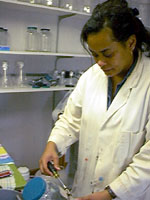 | In this Section: | |  | In the Spotlight |  | News |  |
List of "In the Spotlight" Features
Spotlight On: Dr. Deidre Gibson

|
by Deidre Gibson
I have always been interested in science, and
initially wanted to go to medical school. When I
started college I knew that medicine was
not what I was interested in, so I decided to take
several science courses. I became certified in scuba
diving, and then decided to learn more
about marine science and oceanography. I have been a
student and research technician in the Marine Science
field since 1985. My first
experience was as a student at Shoreline Community
College in Seattle WA, in a program focusing on marine
biology and oceanography
technology. There I gained excellent field and
laboratory skills, and received an A.A.S. in both
areas. I continued my education and received a
B.S. in Oceanography at the University of Washington.
I was surrounded by leading scientist in Oceanography
who both inspired me to continue
in the field, and provided me with very good research
skills.
Being in school for some time, I decided to work in
the field as a research technician in a zooplankton
and phytoplankton laboratory at the
Louisiana University Marine Consortium. There I was
able to advance my field, lab, independent research
skills, and gain experience teaching
students and the community about the marine
environment of Louisiana.
Obtaining my Ph.D. in Marine Science was an obvious
next step in my plan to conduct my own research and
teach. Selecting the
University of Georgia gave me the opportunity to work
with Dr. Paffenhöfer of Skidaway Institute of
Oceanography and some of the excellent
scientists in the University of Georgia Marine
Sciences Department. I was able to continue to gain
experience at a higher level and to fine-tune
my teaching skills by being a laboratory TA in
Biology, where I received the Outstanding Graduate
Teaching Award.
Now that I have obtained my Ph.D., my goal is to use
the skills I have developed over the years to inspire
other students. I have been
given the opportunity to share my research and
graduate student experiences to Savannah State
University students and participants in the
ASLO minority program. These experiences have
encouraged me to contribute to the enhancement of
minorities in the Marine Sciences.
Research is a very important part of my future goals.
I have been fortunate enough to work with doliolids, a
unique taxon of the
zooplankton community responsible for rapid
colonization of neritic environments, especially off
the coast of Georgia. Doliolids (Tunicata,
Thaliacea) have been over- looked as an important
contributor to the marine food web because of the
difficulty in obtaining life history
information in the field and in the laboratory. In my
dissertation studies, I have been able to successfully
quantify, in the laboratory, the feeding
and growth of the only sexual stage in the lifecycle,
and reproduction rates of one of the two asexual
stages at four food concentrations and
temperatures found on the southeastern continental
shelf. I plan to continue laboratory research and
field studies on the various life stages of the
doliolid to enhance an existing mathematical model
that will increase our knowledge on how these
zooplankton function in the marine
environment.
I would ultimately combine research and teaching in a
way to have my future students involved in all aspects
of research so that they are
able to gain as much field and laboratory experience
as possible. The advice and experiences I have
received from helpful scientists throughout
my career have inspired me to do the same for young
aspiring marine science students.
|
